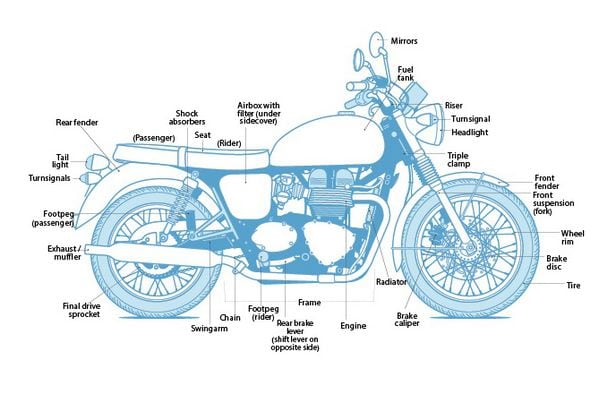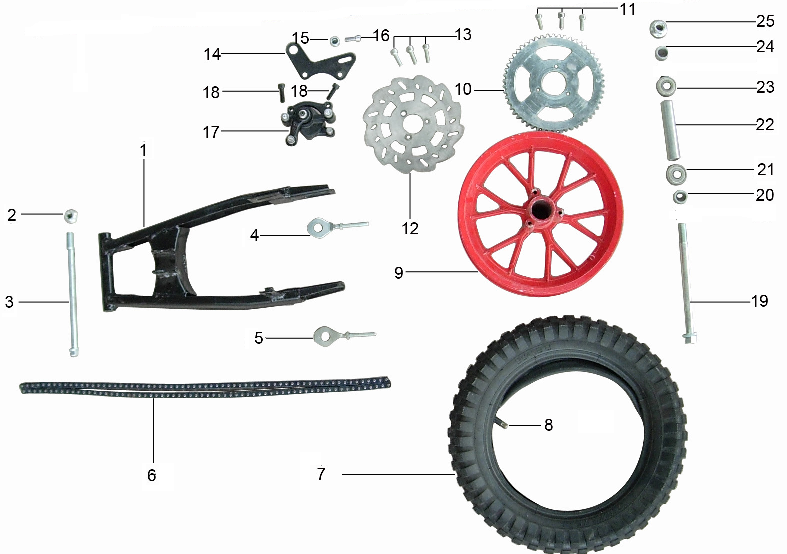The Ultimate Guide to Essential Bike Parts Wellington and Their Functions
The Ultimate Guide to Essential Bike Parts Wellington and Their Functions
Blog Article
Discover the Crucial Motorcycle Parts You Need for Optimum Performance
Recognizing the crucial parts of a motorcycle is essential for achieving peak performance. Each part, from the engine to the stopping system, plays a vital role in total performance and security. Regular maintenance can stop unanticipated failures and improve the riding experience. Nonetheless, many cyclists neglect the ins and outs of these systems. Uncovering just how they collaborate can result in a more efficient ride. What crucial elements should every cyclist focus on?
The Engine: The Heart of Your Bike
The engine works as the core component of a bike, driving its efficiency and specifying its capabilities. It is in charge of transforming fuel into mechanical power, which powers the bike ahead. Various sorts of engines are employed, including single-cylinder, V-twin, and inline arrangements, each offering distinct qualities fit for various riding objectives and designs. The engine size, usually determined in cubic centimeters (cc), considerably influences efficiency, with bigger engines normally giving even more power and torque.Furthermore, the engine's style and innovation, such as fuel injection systems or air-cooling versus liquid-cooling, influence performance and integrity. Upkeep is crucial for peak procedure; factors like regular oil adjustments and monitoring ignition system guarantee long life. Cyclists commonly think about an engine's responsiveness and smoothness, as these qualities improve the overall riding experience. Inevitably, the engine remains a critical component that defines not only the motorcycle's performance yet also the rider's link to the machine.
The Transmission: Changing Gears Efficiently
The transmission plays a vital role in a motorbike's performance, specifically in the auto mechanics of equipment shifting. Recognizing just how to move gears efficiently can boost the general riding experience, while routine upkeep assurances peak functionality. Correct interest to these aspects can considerably impact the longevity and effectiveness of the motorbike.

Equipment Shifting Mechanics
Smooth gear moving is vital for optimal motorcycle efficiency, significantly impacting both velocity and control. The mechanics of gear changing involve the communication between the clutch, equipment bar, and transmission system. When a biker involves the clutch, it disengages the engine from the transmission, permitting for a gear modification without harming the parts. A well-timed release of the clutch, integrated with specific movement of the equipment lever, promotes a seamless modification in between equipments. This procedure guarantees that the engine operates within its finest power band, boosting performance. Motorbike Components NZ. In addition, understanding the equipment ratios and their impact on speed and torque can assist cyclists make informed options during changes, inevitably adding to a more satisfying and receptive riding experience
Maintenance Tips Value
Regular upkeep plays an essential role in ensuring that the transmission system operates efficiently, enabling smooth gear changes. On a regular basis examining and transforming the transmission liquid is crucial, as old liquid can cause enhanced friction and wear. Additionally, examining the clutch for wear warranties peak engagement and disengagement, preventing slippage throughout equipment adjustments. Lubrication of relocating components is similarly vital to lower rubbing and improve efficiency. Bike proprietors must also monitor for leakages and uncommon noises, as these can show underlying issues. By adhering to these upkeep tips, bikers can prolong the life-span of their transmission system, assuring that gear shifts remain smooth and adding to the total performance of their motorbike.
The Braking System: Ensuring Safety And Security on Every Adventure
Braking systems are essential components that directly influence a motorcycle's security and efficiency. They are composed of different parts, consisting of brake pads, rotors, calipers, and hydraulic lines, all interacting to assure reliable deceleration. The kind of stopping system-- usually either disc or drum-- affects responsiveness and quiting power.Regular maintenance is necessary to promote peak performance; worn brake pads can result in lowered performance and enhanced stopping ranges. Furthermore, the high quality of brake fluid must be monitored, as it can take in moisture gradually, jeopardizing braking efficiency.Riders should additionally consider the relevance of anti-lock stopping systems (ABS), which protect against wheel lockup during sudden quits, boosting general safety. Properly operating brakes are not simply regarding stopping; they infuse self-confidence in the biker, permitting more secure navigating via different surfaces. Inevitably, a reputable stopping system is important for appreciating every ride with comfort.
The Suspension: Enhancing Convenience and Control
A well-functioning suspension system greatly contributes to a motorbike's total efficiency, matching the performance of the braking system. The suspension plays a considerable role in taking in shocks from uneven surface areas, guaranteeing a smoother trip while keeping tire call with the roadway. This get in touch with is vital for both stability and control, allowing cyclists to browse edges with self-confidence and precision.Different sorts of suspension systems, such as telescopic forks or mono-shocks, provide varying levels of convenience and handling. Properly tuned suspension enhances responsiveness, providing the rider with an extra connected feel to the motorcycle. Routine maintenance checks are very important to determine the suspension parts, consisting of springtimes and dampers, are operating at their finest. An effective suspension system not only raises the riding experience yet likewise adds to the durability of other motorcycle components by lessening deterioration. As a result, purchasing quality suspension is crucial for any kind of severe motorbike lover.
The Tires: Attaching You to the Road
Tires play a crucial role in a motorbike's performance, functioning as the key link in between the rider and the road. Comprehending the various kinds of tires available can considerably affect managing and security. Furthermore, routine Going Here maintenance is vital to guarantee peak tire performance and durability.
Tire Enters Explained
Just how do different tire kinds affect a motorbike's efficiency? Tire types play a vital function in identifying a motorbike's security, grip, and handling. Sporting activity tires, developed for high performance, deal boosted traction and responsiveness on smooth roadways, making them suitable for competing and aggressive riding. Alternatively, touring tires prioritize toughness and comfort, providing a smoother trip for long-distance travel. Off-road tires, identified by their sturdy tread patterns, master grip on unpaved surfaces, ideal for adventure fanatics. Additionally, dual-sport tires mix qualities from both off-road and on-road categories, dealing with versatile riding needs. Eventually, picking the right tire type is vital for maximizing performance, guaranteeing security, and boosting the total riding experience.
Upkeep Tips Offered
While riding on the roadway, keeping excellent tire condition is crucial for safety and security and efficiency. Frequently examining tire stress is essential, as under-inflated tires can result in poor handling and enhanced important link wear. It is advisable to evaluate tread deepness frequently; worn tires concession grip and security. On top of that, cyclists need to look for indications of damages, such as fractures or lumps, which can suggest the need for substitute. Revolving tires periodically ensures even use, improving long life. Maintaining tires clean from debris and staying clear of excessive aesthetics can lengthen their life expectancy. Maintaining appropriate placement and balance contributes to come to a head performance, reducing stress and anxiety on other bike parts. Abiding by these maintenance pointers will significantly enhance the general riding experience.
The Fuel System: Fueling Performance and Performance
The fuel system plays a crucial duty in making best use of a motorbike's efficiency and efficiency, as it guarantees the optimal delivery of gas to the engine. It consists of a number of crucial components, consisting of the gas storage tank, fuel pump, gas filter, and fuel injectors or carburetor. Each part needs to operate efficiently to guarantee a effective and smooth ride.The fuel container stores fuel and supplies it to the engine using the gas pump, which produces the needed pressure. A fuel filter protects against pollutants from entering the engine, while the injectors or carburetor mix gas with air for combustion.Proper maintenance of the fuel system is vital; a clogged filter or malfunctioning injector can bring about reduced performance and boosted fuel consumption. By validating that the fuel system runs successfully, motorcyclists can delight in enhanced throttle response, far better fuel economic climate, and generally improved riding experience.
The Electrical System: Powering Your Ride
A reliable electrical system is vital for the general functionality and safety and security of a motorcycle, as it powers essential parts such as the ignition, illumination, and numerous electronic systems. This system includes the battery, which stores energy, and the generator, accountable for generating power while the engine runs. The wiring harness you can find out more attaches these parts, guaranteeing trusted power distribution.Additionally, integrates safeguard the system from overloads, while relays aid manage high-current tools with low-power signals. A properly maintained electrical system improves efficiency by guaranteeing smooth begins and regular operation of signals and lights, vital for biker visibility and safety.Regular checks of the battery's fee and connections are very important for protecting against electric failures. Motorcyclists ought to likewise evaluate wiring for wear and tear, making certain all elements work preferably. Ultimately, a robust electrical system adds substantially to the overall performance and integrity of the motorcycle.
Often Asked Inquiries
Just how Usually Should I Change My Bike's Battery?
The frequency of motorcycle battery substitute depends on usage and upkeep (Motorcycle Spares Christchurch). Usually, batteries should be replaced every 3 to 5 years. Normal checks can help determine when a replacement is essential for peak efficiency
What Devices Do I Need for Basic Motorcycle Upkeep?
For basic bike maintenance, one needs vital devices such as an outlet set, wrenches, screwdrivers, pliers, tire stress scale, and a torque wrench. These tools assist in reliable maintenance and assure the bike runs efficiently and safely.
Just How Can I Boost My Motorcycle's Aerodynamics?
To improve bike aerodynamics, one need to think about readjusting fairings, using windscreen expansions, optimizing body placement, and lowering total weight. These modifications assist lessen drag, improving stability and fuel efficiency during rides.
What Are the Indications of a Failing Electrical System?
Signs of a stopping working electric system include lowering lights, difficulty starting, uneven tool readings, and blown merges. Bike Parts Wellington. Unusual smells or corrosion around battery terminals may additionally show underlying issues needing immediate attention for safety and performance

Just how Do I Select the Right Oil for My Bike?
When selecting oil for a bike, one should think about the producer's specifications, viscosity scores, and the type of riding. In addition, synthetic versus standard oil can influence performance and engine protection, influencing the decision substantially. The engine size, generally gauged in cubic centimeters (cc), significantly affects efficiency, with bigger engines typically providing even more power and torque.Furthermore, the engine's style and innovation, such as gas shot systems or air-cooling versus liquid-cooling, affect performance and integrity. A well-functioning suspension system considerably contributes to a motorcycle's total efficiency, complementing the effectiveness of the braking system. The fuel system plays an essential function in making best use of a motorcycle's performance and effectiveness, as it assures the optimal shipment of gas to the engine. A fuel filter avoids pollutants from getting in the engine, while the injectors or carburetor mix fuel with air for combustion.Proper upkeep of the gas system is critical; a clogged filter or malfunctioning injector can lead to decreased performance and raised gas usage. A well-kept electrical system boosts efficiency by making sure smooth begins and regular procedure of lights and signals, important for biker presence and safety.Regular checks of the battery's charge and links are essential for avoiding electric failings.
Report this page